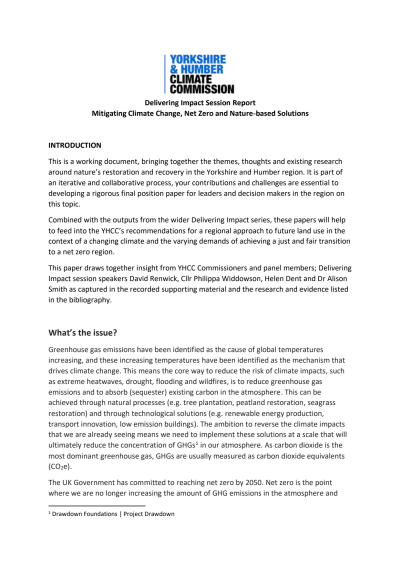Home
How can nature help us?
How can nature help us?
Have your say on how we can manage land to help achieve net zero in the region, and the role of nature-based solutions.
Introduction
Land use plays a significant role in our plans to meet net zero, support nature’s recovery and adapt to our changing climate. To reduce the impacts of climate change we must reduce the greenhouse gas emissions we are producing and also absorb (sequester) existing carbon in the atmosphere.
This can be done through natural processes (e.g. tree plantation, peatland restoration, seagrass restoration) and through technological solutions (e.g. renewable energy production, transport innovation, low emission buildings). These solutions often require a change in how we use or manage land. We have a finite amount of land in our region and we must make difficult choices to balance all the demands we place on it.
Below you will find a draft paper, bringing together the themes, thoughts and existing research and informed by our Delivering Impact session on this topic, setting out actions we can take in the region to achieve net zero by rethinking how we use and manage land.
Please read the paper and give us your views in the short survey below.
Read the draft paper on land use for net zero, then answer our short survey below.

The draft paper brings in ideas and expertise from our Commissioners, research, and experts who are tackling the problem across the country, in the region, and on the ground. You can watch the expert speaker session on this topic in the video at the foot of this page.
At this stage, the paper might not give the full picture so we would really value your feedback. The ideas we are discussing affect everyone - we want to know what you think. Please give your responses in the survey below.
The paper outlines a number of ways we can accelerate our progress towards net zero including:
- Rethink how we prioritise land use.
- Scale up natural carbon storage and sequestration projects.
- Coordinate land use and management across the region to provide multiple benefits that provide for people, support nature's recovery and accelerate progress towards net zero.
- Normalise and prioritise nature-based solutions.
We would like your input to challenge and shape the ideas set out in this first draft.
We are keen to hear from experts on different aspects of land use to ensure rigour in our interpretation of the science and social factors underpinning this paper.
We are equally keen to hear the views of people who live and work in Yorkshire and Humber to ensure our final position paper and actions address the needs of people and communities across the region.
Not important
Very important
Not at all confident
Very confident
Not enough
Enough
Not at all possible
Definitely possible
Not at all confident
Very confident

Drop files to upload
Watch this video if you are interested in watching the full recording of the expert panel presentations on land use for net zero. Watching this video is optional and if you do not want to watch, simply click 'next' to submit your survey.
We heard from four expert speakers in our Delivering Impact Session on 31st January 2023, each presenting their perspectives on how we can rethink land use to meet our net zero targets. The speakers, panel and other attendees then discussed the opportunities and the actions we could take as a region.
- Priorities in land use for net zero and biodiversity gain
David Renwick, Natural England
- York Community Woodland
Cllr Paula Widdowson, York City Council
- Our Journey to Net Zero
Helen Dent, Dairy Farmer and Consultant
- Land-use and nature-based solutions in UK
Alison Smith, Senior Research Associate, Oxford University
